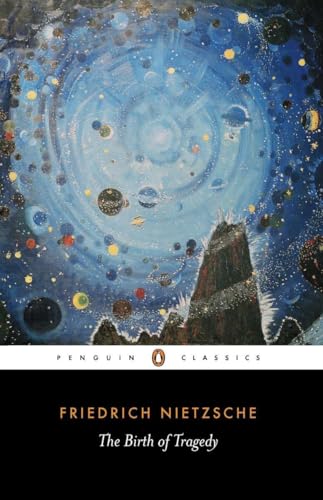The Birth of Tragedy
Out of the Spirit of Music (Penguin Classics)
Friedrich Nietzsche
BOOK REVIEW

In the heart of philosophical discourse, The Birth of Tragedy: Out of the Spirit of Music stands as a staggering testament to Friedrich Nietzsche's genius, igniting an intellectual wildfire that still rages in contemporary thought. This seminal work isn't merely a philosophical treatise; it's a clarion call that challenges the very essence of art, culture, and existence itself. Every page resonates with Nietzsche's indomitable spirit, compelling you to confront the dichotomy of joy and sorrow that defines the human experience.
Nietzsche, a titan of the 19th century, wrestled passionately with life's contradictions, reflecting his tumultuous emotions through the lens of classical art. In this work, he introduces the concept of the Apollonian and Dionysian dualities, representing reason and chaos, respectively. It's a battle of extremes, and Nietzsche doesn't shy away from revealing the raw, pulsating heart of this struggle. He proposes that true art emerges from the synthesis of these oppositional forces, reflecting the complexities and depths of the human soul. You'll find yourself swept away by his lyrical prose, as he eloquently articulates how music transcends mere sound-it becomes the lifeblood of tragedy, evoking an emotional state that defines our very humanity. 🎶
Readers often find themselves divided when grappling with Nietzsche's profound assertions. Some hail him as a visionary who cryptically predicted the societal crises of the modern age, while others critique him for what they perceive as an overly romanticized view of tragedy. One can't help but sense the tension as critiques arise-arguments that Nietzsche romanticizes suffering or overlooks the inherent chaos and unpredictability of life. But isn't that the beauty of this work? It doesn't offer easy answers; instead, it plants seeds of contemplation, forcing you to delve deep into your own beliefs about art and existence. 🌌
As you navigate through this philosophical landscape, Nietzsche invites you to embrace the tragedy of life rather than shy away from it. His passionate exploration of the Greek tragedies serves as both a historical commentary and a timeless metaphor. These ancient stories, riddled with human flaws and the consequences of ambition, resonate with modern dilemmas. There's a reason why Nietzsche's ideas have rippled through the thoughts of eminent figures like Sigmund Freud, who drew parallels between art and psychological turmoil, and the existentialists like Jean-Paul Sartre, who echoed Nietzsche's themes of absurdity and authenticity.
But let's not gloss over the historical context in which Nietzsche wrote this magnum opus. Emerging from the shadow of the Enlightenment, a period marked by reason and scientific rationality, Nietzsche's work can be seen as a radical departure-a rebellion against an age that sought to box in human emotions and experiences. Written in 1872, during Germany's ambitious cultural awakening, The Birth of Tragedy challenges the emerging bourgeois values and posits art as an arena for embracing life's chaos, a daring act of defiance suggesting that life, in all its messiness, must be celebrated. ⚡️
Readers' comments reflect this multiplicity of interpretations. Many are enchanted by Nietzsche's vivid imagery and passionate prose, recounting how they were swept into an existential reverie, drowning in the beauty and horror that art can convey. However, some find Nietzsche's ideas, particularly regarding music's role in tragedy, somewhat inaccessible, struggling to reconcile their understanding of art's purpose with Nietzsche's lofty ideals. The juxtaposition of applause and dissent mimics the Apollonian and Dionysian struggles, emphasizing that Nietzsche's work, like the tragedies he praises, is not universally adored but rather a tempestuous dialogue.
Engaging with The Birth of Tragedy is not merely an academic exercise; it is an emotional odyssey that can ignite a profound transformation within you. Nietzsche compels you to confront the shadows lurking within your own psyche, urging you to embrace both the ecstasy and the agony that life presents. So, as you delve into this philosophical masterpiece, prepare to be challenged, stirred, and forever altered by Nietzsche's words that dance provocatively between the sacred and the profane, between life and art. Can you feel the pulse of tragedy? The question isn't merely rhetorical; it's a challenge that resonates through the ages. ✨️
📖 The Birth of Tragedy: Out of the Spirit of Music (Penguin Classics)
✍ by Friedrich Nietzsche
🧾 160 pages
1993
#birth #tragedy #spirit #music #penguin #classics #friedrich #nietzsche #FriedrichNietzsche